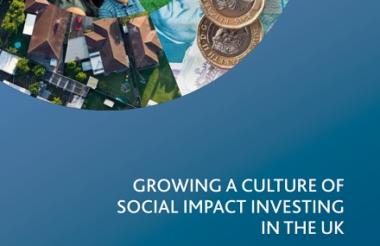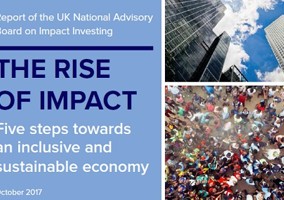A wide ranging report on social impact investing has been published by an independent advisory group commissioned by the government.
The report, entitled Growing a Culture of Social Impact Investing in the UK, includes 53 recommendations for government, industry and umbrella organisations to help grow the social impact investing market.
Elizabeth Corley, vice chair of Allianz Global Investors, was appointed last year to chair the advisory group.
In her preface to the report, Corley says that despite initially being set up by government for a fixed-term the advisory group will “continue to provide a focal point for those interested in the growth of impact investing in the UK, and sustain a focus on the actions we have identified”.
A foreword by two government ministers, charities minister Tracey Crouch and economic secretary to the treasury Stephen Barclay, says: “There are many valuable ideas in this report which merit further consideration. Social impact investment is an area where the UK has been and should continue to be a global leader.”
Its recommendations include:
- Government should increase its participation in co-investment models to encourage the provision of capital to social impact investments, potentially taking a first loss position in some circumstances.
- Industry should commit meaningful ongoing resources to work with government, the social sector and regulators on identifying investment approaches that can be used to deploy capital to tackle entrenched social and economic problems.
- Where feasible, companies should increase their focus on creating demonstrable positive social impact alongside financial returns. This would lead to an increase in the number of traditional companies that are achieving measurable social impact and expand the investable universe for impact investors.
- Relevant regulators and other statutory bodies should continue to build capability in relation to social impact considerations so that, as the market develops, social impact is embedded in regulatory frameworks and understanding.
- Industry should engage widely to improve professional skills for social impact; to work with academics and service providers to develop a robust performance/outcome evidence base; to develop with industry bodies initiatives to sustain momentum and ensure quality as the market develops; and to provide tools and training for pension scheme trustees and independent financial advisers.
- Professional bodies should accelerate professional development around ESG and social impact investment, through CPD and professional qualifications. They should work with industry to ensure the use of common terms across educational materials.
- Industry should work with the Investment Association and CFA Society UK to develop consistent good practice and set common standards for social impact investing. This would include determining processes and reporting, potentially using the SDGs as a framework.
- The Department for Business, Energy and Industrial Strategy should explore, with the FRC, how best to encourage UK business to increase transparency on the contribution business makes towards the achievement of the UN SDGs.
- Each organisation to publish educational guidance on social impact investment and its relation to ESG, with reference to the others’ work to ensure consistency.
- A cross-sector industry working group, led by the Investment Association, should coordinate the development of best practice.
- The industry should continue to develop its savings, pensions and investment product suite with the individual investor in mind, utilising both ESG and social impact investment options.
- A wide body of research suggests that an allocation to less liquid, longer term investments is likely to enhance portfolio returns over time, but the financial services ecosystem has developed in a way that biases towards daily pricing and trading. All participants have a role in the systemic change needed to support the inclusion of these assets – many social impact investments currently fall into this category.
- Trustees should work with employers and pension providers to develop best practice for better engaging scheme members with their pension investments and encouraging them to register on their pension platforms.
- Industry, supported by government, to convene a follow on group to allocate responsibility for taking forward specific actions, to monitor progress and to ensure sustained positive momentum continues. A thought-leadership conference should be held by summer 2018 as part of this process.
- The industry should both stimulate and celebrate progress in social impact investment through awards.
Related articles











